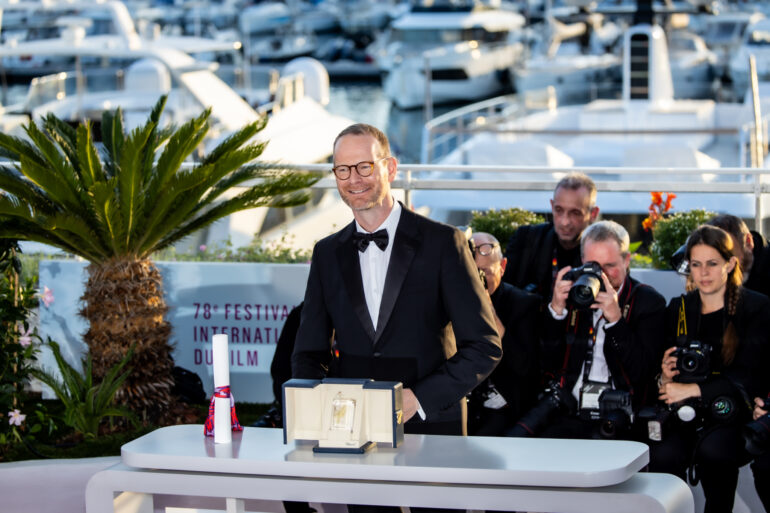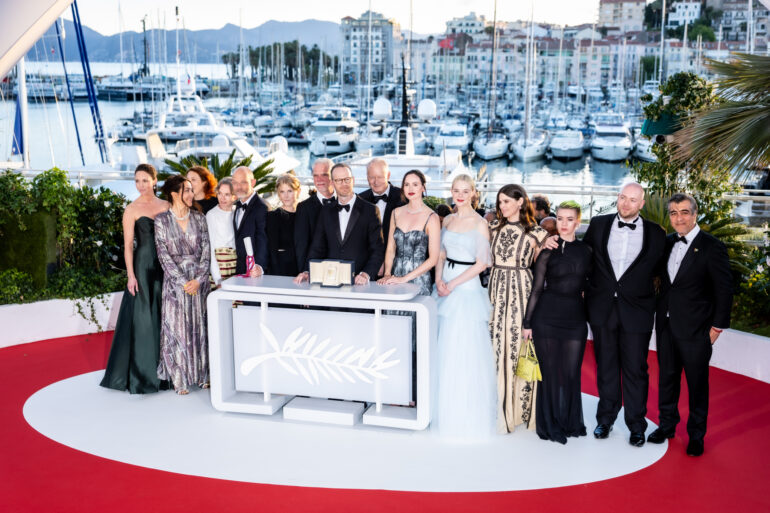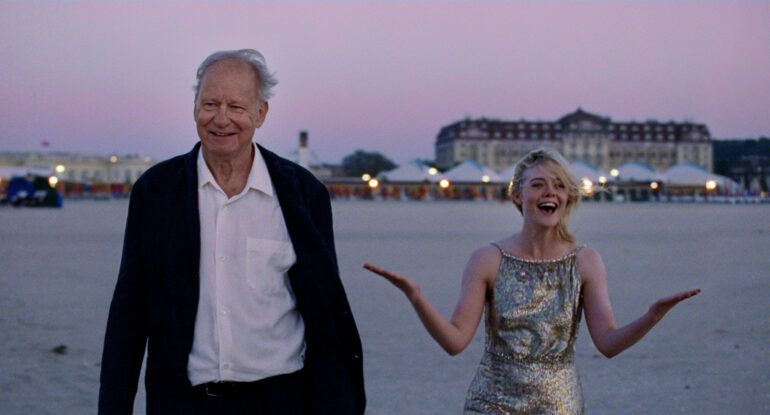Written by: Jan Lumholdt
26.05.25
Joachim Trier’s Sentimental Value won the Grand Prix in Cannes 2025: The director’s road from punk culture and being the nice Trier to mastering vulnerability.
“I come from a small, weird country up North that doesn’t really have a great cinema history, so… it’s a treat.”
14 years ago, in 2011, there were suddenly two Triers at the Cannes Film Festival. The older one, Danish Lars von, rode into town as the great conqueror, turning world cinema inside out and upside down with seemingly endless imagination and provocation for decades. Only this time he went a little extra far, not on the screen, but at the press conference, where some awkward Nazi-themed jokes got him into trouble with the festival.
The new kid, Norwegian Joachim Trier, did better. Oslo, August 31st (Oslo, 31. august) screened in the Un certain regard section to warm acclaim, and he instantly got dubbed “the nice Trier” – a compliment he took some offence to at the time (“Hey, hold on, dammit, who wants to be the nice guy?!”).
His 2015 Cannes return, Louder Than Bombs, now in main competition, was an international production co-starring Jesse Eisenberg, Gabriel Byrne and Isabelle Huppert, names that confirmed his growing status. With The Worst Person in the World (Verdens verste menneske, 2021), Joachim was neither a new nor a very nice Trier, he was his own great conqueror, even Oscar-nominated for his screenplay (co-written with ever-cohort Eskil Vogt) – something “older Trier” has yet to accomplish.
2025 brings Sentimental Value (Affeksjonsverdi), which world premiered in the main Cannes competition on May 21. Two days later, the film was firmly touted as a most likely major prize-winner by the major trade publications, judging by critical reception – “Trier’s resonant family drama treats a beautiful old house as the foundation for healing” (Variety), “Piercing reflection on family and memory” (Hollywood Reporter), “Renate Reinsve and Stellan Skarsgard bring incredible tenderness to the story” (Screen International) – and a standing ovation (at least 15 minutes; some say 19). One day later, Joachim Trier rode into the award ceremony, receiving the Grand Prix from a jury headed by Juliette Binoche. In a year that started with a Golden Berlin Bear win for Trier’s countryman Dag Johan Haugerud and the film Dreams(Drømmer), it seems a film phenomenon may be going on in that “small country up North”, about to get itself a great cinema history?
Including Trier’s three titles, Norway has thus far had nine entries in the main competition in Cannes. Four are by elder statesman of Norwegian cinema Arne Skouen during the 1950s, most notably Nine Lives (Ni liv, 1958), one, Next of Kin (Arven, 1979), is by Anja Breien and one, The Chasers (Jakten, 1959), is by Erik Løchen, Joachim Trier’s maternal grandfather, who could indeed be the start of something big.
“I’m a third generation filmmaker. I grew up with a film camera in my hand. I filmed since I was a child. It’s intuitive, and it wasn’t really a choice. I’m really relieved that I was able to be allowed to continue doing it and make a living out of it.”
Sentimental Value actually features a film director among the main characters, one Gustav Borg (Skarsgård), who shares the central story with his two estranged daughters Nora and Agnes (Reinsve and Inga Ibsdotter Lilleaas). A bona fide Hollywood star also turns up, played by Hollywood star Elle Fanning. Anders Danielsen Lie and Jesper Christensen appear in supporting parts, as does the house that’s been in Nora, Agnes and Gustav’s family for generations.
“Eskil and I love human stories and intimacy with the characters, but to make just a chamber play wasn’t what we wanted to do, we also love to have fun with cinema. The house gave us an opportunity to get a perspective on time, on life span, a testimony on life and how short it lasts. Also, on a personal note, my family actually had a house that was built by my great-great grandfather that was sold during the process of writing, and I realised the specificity of the place as a representation of memory.”
The director admits that “it’s kind of lovely” to finish and send this film out. “I’ve been kind of living in this quite melancholic place now for quite a while – but it’s been wonderful as well.”
And no longer does he seem to resent a certain nice-ness attributed to his personality. “We come from a punk background, me and Eskil, we were counterculture and didn’t want to make sappy films, but we realised through the films we’ve made that we’ve grown older and that the world is a tough place, so maybe we need to be vulnerable and show characters that are vulnerable, men and women and everyone else?”
“So we came to a conclusion: Tenderness is the new punk.”
“For me it’s what I need right now. I need to believe that we can see the fellow human. I need to believe that there is a sense of reconciliation; that polarising and anger and machismo isn’t the only way forward here. That’s where we’re coming from with this one.”
Again, something the “older Trier” has yet to accomplish.
Sentimental Value will have its national premiere September 12. It is produced by Maria Ekerhovd (Mer Film) and Andrea Berentsen Ottmar (Eye Eye Pictures), in co-production with Film i Väst, Zentropa (Sisse Graum Jørgensen), Zentropa Sweden (Lizette Jonjic), MK Productions (Nathanael Karmitz), Lumen Production (Juliette Schrameck), Komplizen Film (Janine Jackowski, Jonas Dornbach), and supported by Nordisk Film & TV Fond, the Norwegian Film Institute, Oslo Filmfond, Storyline, the Swedish Film Institute, the Danish Film Institute, Eurimages, Medienboard Berlin Brandenburg, FFA, BBC Film (Eva Yates), Arte Grand Accord, and Normandie Regional Fund.



